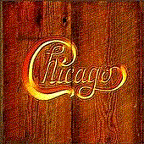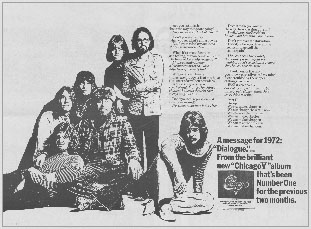![]()
  |

Chicago V
Chicago
Columbia 31102
Released: July 1972
Chart Peak: #1
Weeks Charted: 51
Certified Double Platinum: 11/21/86






 If Blood, Sweat and Tears was the Hertz of big band jazz-rock in 1969, then Chicago was most assuredly Avis. While BS&T was the trailblazer in the genre, Chicago developed a distinct identity as concerned spokesmen for the "we can get it together" faction of the youth populace.
If Blood, Sweat and Tears was the Hertz of big band jazz-rock in 1969, then Chicago was most assuredly Avis. While BS&T was the trailblazer in the genre, Chicago developed a distinct identity as concerned spokesmen for the "we can get it together" faction of the youth populace.
The Second City men also put together an extremely direct, easily identifiable set of jazz-derived horn section licks which would not cause any trepidation among their millions of fans. As such their albums are certified RIAA gold approximately six months prior to release, despite the fact that their melodies are eminently forgettable and they lack a vocalist who exceeds the level of commonplace competence. Chicago is now in the position once held by BS&T: rulers of big band rock.
Perhaps it is not quite equitable for me to review Chicago. Scattered hearings of their previous efforts have bored me to the point of pursuing the Bayonne, New Jersey shipping reports. Certainly their musicianship is beyond reproach (especially trombonist James Pankow, who is a bitch) and I do not doubt their sincerity vis-a-vis fair play in politics any more than I doubt Fatty Arbuckle's licentiousness.
 Click image for larger view. |
Their legions must feel somewhat swindled by Chicago V. There are no booklets on how to register to vote, no sepia-tone poster of a celebrated concert hall and no audible musical advancement, save for "A Hit by Varese," a bracing number in 6/8 with oblique horn voicings. "Varese" opens the set by asking, "can you play free, or in three or agree to attempt to try something new..."
Apparently the answer is "no," as the band lumbers through the bulk of the album like a mastodon with shin splints. I wonder if Chicago devotees would desert the boys if they decided to abandon, or at least altar, their formula and challenge themselves a mite.
- James Issacs, Rolling Stone, 12/7/72.
Bonus Reviews!
Upfront, in a word, Chicago's latest album is great. This two-sided effort (as opposed to their usual four sides) runs about 45 minutes and packs the same exciting wallop as their earlier discs. It is the standard Chicago package. Nothing has changed. Posters? Yes. Two. Logo? The same. Lettering? Again we have Beverly Scott's script.
And the music? Once again Robert Lamm and company have knocked me out. It is the usual eclectic bundle of happiness and sadness, love songs, and songs of socio-political import. To Chicago's other classics like "Beginnings," "Make Me Smile," "Fancy Colors," and "25 Or 6 To 4," add "Saturday In The Park." Whether your park be N.Y.'s Central, Chicago's Lincoln, L.A.'s MacArthur, or your own small town's Village Green, you'll see it when you hear "Saturday In The Park." This is a happy and a very visual song. Definitely an "up"; especially since it follows "While The City Sleeps," an ominous warning about the future. The feeling of threat carried on the brass riff is unrelieved.
Further reading on Super Seventies RockSite!: Album Review: Chicago IX/ |
Back on the upbeat again (Side Two is an emotional roller coaster taking us back and forth between ups and downs), "Goodbye" is a charming number. The unity lacking in "State Of The Union" is regained. Peter Cetera's bass is very prominent here. "Alma Mater" is a showcase for Robert Lamm on piano.
On Side One we take off Airplane-style into "A Hit By Varese." The bridge on this tune has a dynamic three-way duel with Walter on sax, Jimmy on trombone, and Lee on trumpet taking turns astounding the listener. "All Is Well" has a soft sound that is very mellow and light. "Now That You've Gone," written by James Pankow, opens in layers -- drums; then drums and guitar; and then, drums, guitar, and Mr. Pankow's trombone. Everyone in the group gets his moment in the spotlight here. This is another of those typical Chicago rockers that is so very effective.
"Dialogue" is a two part number. "Part 1" won't be a Chicago classic, but is my favorite on the album. The contrast in voices makes this song exceptional. Terry's husky, deep voice alternating with Peter's higher and smoother voice creates an exciting listening experience. "Part II" is the final uplifting message song in the manner of "It Better End Soon," from an earlier album.
If you are a Chicago freak, this album is a must. If you "just like" Chicago, please accept my recommendation. If you don't like Chicago (horrors!!), you shouldn't have read this far.
- Michael J. Davis, Words & Music, 11/72.
The long-awaited new LP from Chicago was well worth waiting for. The super heavy package contains some nine new numbers that will prove strong programmers. Highlight cuts include "Saturday in the Park," "While the City Sleeps," "All Is Well," and an interesting reflection on politics, "Dialogue." Their first single record will prove a giant.
- Billboard, 1972.
Bear with me; this may take time. I'm trying to figure out why I don't like Chicago. Well, what do I know of them? They are the product, really, of a demanding and talented young producer, James William Guercio, who produced all the Chicago albums and the second (and most important) album by Blood, Sweat & Tears. Am I penalizing Chicago because I don't like BS&T? Is that why Chicago's lead singer tends to sound more and more like David Clayton-Thomas.
Do I dislike them because they seem to combine the most obvious things about preachy-lyric rock? Are they bad musicians? No -- they are very good musicians, in fact. Why, why, why? Hmmmmm. Scratching of forehead. Pacing of room. Snap of fingers. Slapping of brow. Exultant shout of "Eureka!" Dash to the typewriter. Locking of keys into upper case. Wetting of lips, tensing of fingers, short rush of air as hands descend to the keys -- THEY BORE ME!
- Joel Vance, Stereo Review, 2/73.
The group's avant-garde roots are explored on the set -- opening "A Hit by Varese," while the album also includes the autobiographical "Alma Mater" and the hits "Saturday in the Park" and "Dialogue." * * *
- William Ruhlmann, The All-Music Guide to Rock, 1995.
Chicago V is a modest affair but still has plenty of melodic clout with "Saturday in the Park" and the charmingly dated "Dialogue, Parts I and II." * * * 1/2
- Gary Graff, Musichound Rock: The Essential Album Guide, 1996.
![]() Reader's Comments
Reader's Comments
Tom Dynes
Yes I know it's 45 years too late, but if Chicago are the "penultimate" cockeyed optimists, I'd like to know who the last ones are? Since "penultimate" means "next to last", not "ultimate" or "super ultimate" or whatever ignorant thing the author thinks it means. Idiot.
Religion is Cancerous
Chicago at their absolute best in my opinion.
